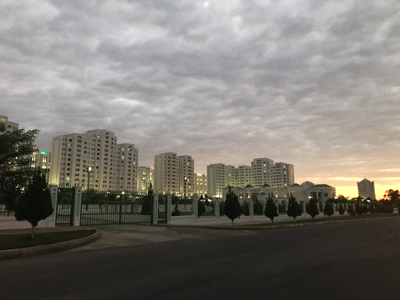2020 Japanese-Language Assistants’ Report: Japanese Language Education in the Field in Turkmenistan-the Country of White Marble
Dovletmammet Azadi Turkmen National Institute of World Languages/
National Institute of Education of Turkmenistan
OUCHI Masafumi
Turkmenistan is a country in Central Asia located west of the Caspian Sea, south of Uzbekistan and Kazakhstan, and north of Iran. As of July 2020, the Japan Foundation (hereafter referred to as "the Foundation") has dispatched a Japanese-Language Senior Specialist (hereafter referred to as "Senior Specialist") and a Japanese-Language Assistant (hereafter referred to as " Assistant").
Japanese language education in Turkmenistan began in 2007 at one of the host institutions, the Dovletmammet Azadi Turkmen National Institute of World Languages (hereafter referred to as "Azadi Institute"), and will soon mark 15 years. We are grateful that Turkmenistan is working on Japanese language education as a nation, and that the number of students currently studying Japanese is over 3,000, with the number of students at the Azadi Institute increasing every year.
The duties of Assistant in Turkmenistan are to conduct Japanese language classes, prepare various teaching materials and class materials, and provide overall support to local teachers. In Turkmenistan, the number of Japanese residents is small, and one of the important roles is to be there as "a Japanese person" for those who are involved in Japanese language education and universities.
If I had to describe my impression of the role in Turkmenistan in one phrase, it would be "being far from Japan." Since there are fewer than 100 Japanese people in Turkmenistan, most of the people in my country of assignment have never seen a Japanese person in the flesh, nor have they ever heard the Japanese language.
For this reason, when I teach Japanese classes, I try to conduct them almost exclusively in Japanese and try to communicate with as many students as possible in Japanese, even if it is just a few words. It seems to be good stimulus to be able to speak Japanese with a Japanese person, and the local students happily and enthusiastically participate in the classes of the Assistant and Senior Specialist as "a Japanese person's class," which inspires me to try to meet their expectations as much as possible.
When supporting local teachers, our support as "a Japanese" is sought.
Turkmenistan's Japanese language teachers are very busy, not only teaching classes, but also handling events to introduce Japanese culture, and occasionally responding to requests for translations. In such cases, there are requests for native Japanese speakers to check their Japanese, or to teach them about aspects of Japanese culture that can be easily introduced to others, so I make full use of my abilities as a Japanese person to help them in any way I can, such as by telling them about calligraphy or Japanese food.
Regional circumstances mean that it is not easy to bring in cultural experts or to order various things from Japan, so not only the local teachers but also the dispatchers have a hard time. Since we can't order teaching materials as often as we'd like, we have to make modifications to existing materials and create new tests and other teaching materials.
As the number of learners increases, the number of students, and of those with Japanese language experience, who wish to study in Japan through the various study-abroad programs offered by the Ministry of Education, Culture, Sports, Science and Technology is increasing. For students, university life in Turkmenistan and Japan is completely different, in that Turkmenistan universities take close care of students, while in Japan they are basically left to their own devices. So, also in my role as "a Japanese," I offer advice to those interested in studying abroad and talk about real student life in Japan. Perhaps as a result of that, in 2019 and 2020 (planned as of July 2020) students from the Azadi Institute have gone to study in Japan.
Turkmenistan is located in the Karakum Desert, where temperatures can exceed 40 degrees Celsius in the summer. In early summer, classes are held in sweltering heat, and it is not uncommon to see both teachers and students drenched in sweat. However, the enthusiasm of teachers and students involved in Japanese language education is even hotter still, and they earnestly work on studying Japanese. Although Turkmenistan is a country "far away from Japan," I hope that the enthusiasm of the local people, the increasing number of students and teachers who have actually visited Japan, and the Japanese people who will continue to be involved in Japanese language education in Turkmenistan will create a Japanese language education program that can quickly overcome the geographical distance. I also hope that I can contribute to this project in my own little ways.

Marble buildings line the city streets
- What We Do Top
- Arts and Cultural Exchange [Culture]
- Japanese-Language Education Overseas [Language]
- Japanese-Language Education Overseas [Language] Top
- Learn Japanese-language
- Teach Japanese-language
- Take Japanese-Language Test
- Know about Japanese-language education abroad
- The Japanese-Language Institute, Urawa
- The Japanese-Language Institute, Kansai
- Japanese-Language Programs for Foreign Specified Skilled Worker Candidates
- Japanese Language Education for Japanese Children Resident Overseas and for the Descendants of Migrants
- Archives
- Japanese Studies and Global Partnerships [Dialogue]
- JF digital collection
- Other Programs / Programs to Commemorate Exchange Year
- Awards and Prizes
- Publications
